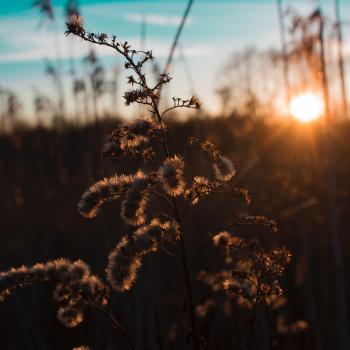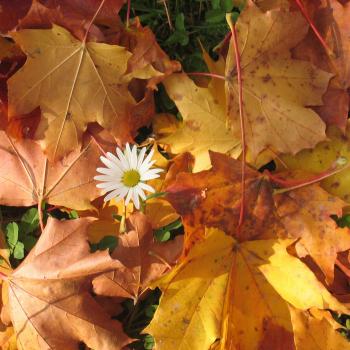One of the things I’ve come to appreciate most about Unitarian Universalism is how it unabashedly embraces multifaith belonging and interfaith conversation. Out of that insatiable hunger for a meaningful spiritual life, UU draws on a diversity of sources ― from science and art, to religious and philosophical traditions from around the globe, to the direct experiences of the earth and its mysteries through the sensuous engagement of our own bodies.
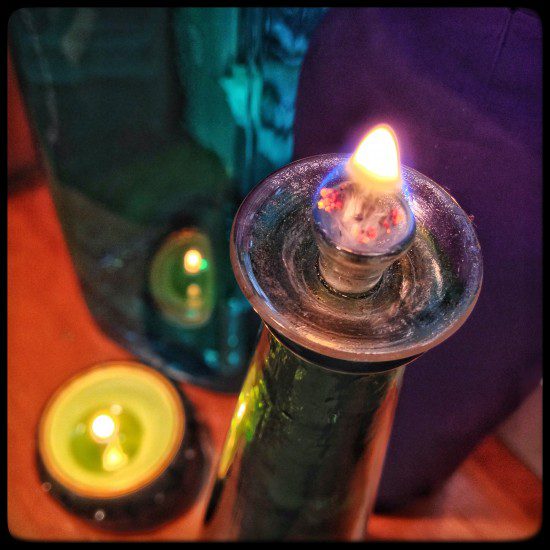 This crazy jumble of traditions and perspectives suits the poet in me just fine. I revel in the potential for serendipity, the discovery to be found in weird juxtaposition. I celebrate being an artist living ― as Annie Dillard puts it ― “jammed in the pool of materials.” In fact, the UU experience of bringing art, religion, science and philosophy into mindful, compassionate conversation with each other often reminds me of my all-time favorite Dillard quote, from her classic Holy the Firm:
This crazy jumble of traditions and perspectives suits the poet in me just fine. I revel in the potential for serendipity, the discovery to be found in weird juxtaposition. I celebrate being an artist living ― as Annie Dillard puts it ― “jammed in the pool of materials.” In fact, the UU experience of bringing art, religion, science and philosophy into mindful, compassionate conversation with each other often reminds me of my all-time favorite Dillard quote, from her classic Holy the Firm:
A nun lives in the fires of the spirit, a thinker lives in the bright wick of the mind, an artist lives jammed in the pool of materials. (Or, a nun lives, thoughtful and tough, in the mind, a nun lives, with that special poignancy peculiar to the religious, in the exile of materials; and a thinker, who would think of something, lives in the clash of materials, and in the world of spirit where all long thoughts must lead; and an artist lives in the mind, that warehouse of forms, and an artist lives, of course, in the spirit. So.)
Oh, the lively bliss of “or”!
Dillard wrote this book while living on an island in Puget Sound, in a room “plain as a skull” with only “one enormous window, one cat, one spider and one person.” In the sparsest surroundings, with the simplest rituals, we can open up a space to explore these inner worlds where poet, philosopher and spiritual seeker jostle and dance.
After fifteen years of being an ex-Catholic, I find myself drawn back to one such simple ritual thanks to the supportive interfaith space that UU holds open: the practice of Lent. For the past few weeks, I’ve been following along with the #UULent daily words for contemplation, allowing them to swirl and clash and mingle and bounce off of my Pagan practice. I start each morning with a quote or two on the day’s theme, not trying to force any particular meaning but allowing the words to settle and speak to me as I craft a simple daily altar on the windowsill by my desk. I give my inner artist, nun and thinker space to explore, to sit together and enjoy a cup of tea instead of pitting them against each other to see which is strongest, which is best. And then, I sit down at my computer… and I see what arises from the keyboard.
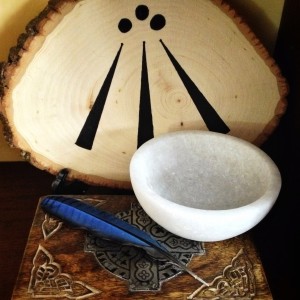
Day 6: Joy
“My dreams have always been full of blue jays. Sometimes they linger in the background, just on the edge of my vision. Sometimes I find myself in an open field, holding in my hands a bowl full of salt that, once spilled, is tossed into the air in unlikely spirals carried on the shrill winds and becomes a suspended sea of white feather down which settles gently to cover the earth like a late spring snow. In these dreams I ask the winds, ‘How do I pray without fire?’ And the winds answer by bringing me a blue jay.”
Crafting my altar today was a lesson all by itself, an exercise in false starts.
The words “inspire joy” did not spark anything particularly insightful, other than the obvious. I had no real vision for how to express them or what they meant to me. I had a migraine that’d been haunting me for the past few days, and which had swelled overnight into a full-blown demon-possession (albeit a rather polite, self-deprecating kind of demon). And on top of everything I had very little time, because of an appointment this morning that had me rushing to pull something together before I left the house.
So I rooted through my various little treasure chests of altar items, pulling out pieces that made me smile ― an acorn, a few polished stones, a twisted twig, a feather or two, a little carving of a frog, my prayer beads ending in an amber sun. But the result was cluttered. I felt dissatisfied. I kept arranging and rearranging, bit by bit whittling away at the items until only a few were left ― but nothing felt right. Finally, out of time, I took one last picture and blew out the candle.
If I hadn’t been on my way out, that might have been the end of it. But since I didn’t want to leave the feather on the windowsill where the cat was bound to bother it while I was gone, I placed it on a high shelf of my bookcase, out of reach.
And there it was, right out of my dream. This was my altar to joy. Not the clutter of little trinkets that made me happy, but the simplicity of this unintended arrangement that reached suddenly out of sleep and shook me awake to an old memory of inarticulate wonder. The memory of an open field, an altar, a bowl of salt ― and the question, “How do I pray without fire?”
Joy, the unlooked-for answer. What arrives on blue jay wings.
I think of fire and water as the primordial polarity of my spiritual practice. The fires of inspiration sometimes take work, preparing the kindling, striking the stone. The waters of joy, on the other hand, come and go according to their own kind of gravity. I guess some days, the best you can do is cup your hands together and pray for rain.
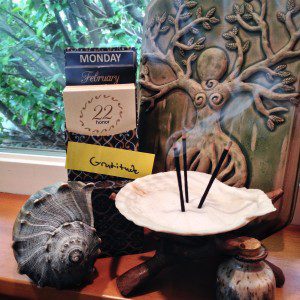
Day 12: Gratitude
“Piglet noticed that even though he had a Very Small Heart, it could hold a rather large amount of Gratitude.”
― A.A. Milne, Winnie-the-Pooh
There are some days when I feel I must have a Very Small Heart indeed. Days when I manage to be only imperfectly grateful.
Days when the only way I know how to be grateful is to be restless and dissatisfied. To look around at my life and the richness of beauty and love in it ― and to look at a world full of people struggling to make ends meet, fighting to be heard, aching for compassion, toiling away in the name of justice ― and think to myself, “How little this love, this beauty matters unless I can give it away…”
There is so much in my life to be grateful for, my heart is not big enough for it all. Sometimes it makes me feel downright claustrophobic. I don’t deserve it, I don’t feel lucky. Instead, I feel unjustly privileged. I get angry at myself for having the happy childhood, the supportive partner, the brilliant stepkids, the roof over my head, the food on my plate. Food that makes me fat and lazy. Stepkids who are too sheltered and optimistic for their own good. A partner who takes my side even when he probably shouldn’t, who never ceases to love me even when I’m a bitch. A childhood that I spent joyfully nurturing my own passions and fancies when I should have been learning how to be responsible and hard-working and better at making other people happy. I should be better at making other people happy by now, I think when I look at my life. What good is all this beauty, all this love and support, if I can’t help other people be happy?
But then there it is again, lurking in the quiet spaces, hiding just beneath the surface of simple moments and small treasures ― the unrelenting grip of gratitude. No matter how hard I work to give it away, the moment I stop to breathe it washes over me again. Sometimes I think, in all this world of longing and striving, gratitude is the one thing you cannot dig up and divvy out.
It helps to think of gratitude as a goddess. There are days when I am only imperfectly grateful for my life. On those days, maybe the best I can do is honor her with offerings, and hope that she will weave her way like smoke and seawater into the hearts of those who need her most. On those days, maybe I don’t feel lucky. Maybe I just feel angry at all the blessings I cannot give away ― the morning sunlight, the sound of rain, the full moon ― but maybe it’s enough that at least I’m trying. Maybe trying is enough.
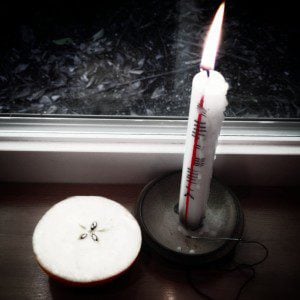
Day 15: Dreams
“But I, being poor, have only my dreams;
I have spread my dreams under your feet;
Tread softly because you tread on my dreams.”
― W.B. Yeats
Last night I had a dream that you blamed the cat for knocking the statue of my god off the bookshelf, its head smashed in, its limbs a shattered wreck of dust on the floor. But the shelf was not that high, I said, and my gods have fallen so many times before unharmed. I couldn’t believe you. Neither could the cat, who’d left little paw prints through the white crumbled clay as crisp as an animal’s, his conscience clean.
Last night I had a dream that I was sewing the two halves of the world together with a needle and thread. The thread was thin and black and hard to see against the night sky. The needle glinted each time I shoved it into the heavy fabric of heaven, and each glint became a star. But the thread was like an invisible wind darting back and forth across the horizon ― sometimes loose, lazy and useless ― sometimes so tight it snapped and I had to start again.
Last night I had a dream that I was eating apples. Every one of them was sharp and dry like wine on my tongue. When I stood up to go, you could hear the seeds rattling in the empty chambers of my heart. I wasn’t even sorry.
Last night I carved the word “aisling” ― dream ― into the side of a candle and put it, lit, beneath my pillow while I slept. This morning, I woke with sunlight in my eyes. Now the candle says only “ais” ― return ― and my cheek is creased with soot.
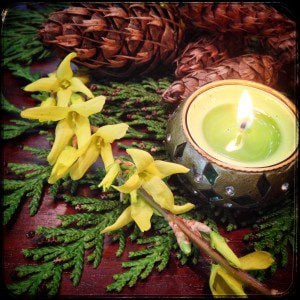
Day 16: Mistakes
“There are worlds great and small everywhere, worlds within and worlds without, and every one is a wonder to behold and remember and love with her eyes… Surely, she can do this for a little while longer.”
― Cate Kerr
I didn’t want to write this morning. It can be incredibly discouraging to pour words into the silence over and over again, and get nothing back except the work itself and what it does to you. It makes you feel a little bit crazy.
I’ve heard people say of their writer’s block that it comes from the realization that words just cannot capture reality, so they stay stopped up and silent in the face of a world they cannot trap or tame. Maybe I’m just too in love with words, but this always seemed exceedingly silly to me. As if the musician sits down at her instrument and thinks, “I cannot explain music to people this way, so what is there left to play?” But of course, that’s not what music is for ― music is for itself, the entangling melodies of breath and fingertips, taut skin and strung-out guts and polished wood. Music is just a movement, a way of making the noise of our bodies beautiful.
Words are the same. A way of entangling ourselves in memory and experience and dream, to meet and then lose ourselves again in the untangling. At least, I think so. But maybe that’s a mistake.
When I don’t want to write, it’s because I don’t know what people want from me. They want my opinions, and I bring them a fistful of feathers. They want numbered instructions, so I arrange pebbles and flower petals into little mandalas inside my heart to show them how numerology works. This is no help to anyone. “That’s very pretty,” they might say, but after a while I think they probably start to wonder if I’m misunderstanding them on purpose.
There is something, among certain Christians, that they like to say about sin: which is that it means “to miss the mark.” Maybe you want writing that is like an arrow ripping through the air on its way to the bullseye. Mine will be sure to disappoint you then, circling lazily like a kestrel above a landscape full of sleeping prey. “This must be a mistake,” you will probably say, “you’ve completely missed the point.”
What can I say? Only: here it is, the center around which I have been turning all along.
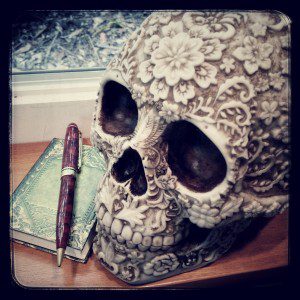
Day 24: Memory
“I can only note that the past is beautiful because one never realises an emotion at the time. It expands later, and thus we don’t have complete emotions about the present, only about the past.”
― Virginia Woolf
Here’s a story about my mother (and I hope she forgives me for telling it). She heard once on TV that the safest place for something in a house fire is inside the oven, because an oven is insulated to keep the heat in and so it’s pretty good at keeping the fire out. If you wanted to salvage something in a house fire ― like say, important financial documents or a family heirloom ― sticking it inside the oven might just work. (I should note: I have no idea if this is true. Do not try this at home.) So one year, before leaving on vacation, my mother put her wedding photo album inside the oven… just in case the house burned down while she was away.
As these things happen, she and my dad returned home from vacation happy but exhausted from the trip, and decided to order pizza for dinner so they wouldn’t have to cook. They turned the oven to preheat so they could keep the pizza warm once it arrived. Soon, the whole kitchen smelled of scorched paper. My dad threw open the oven door to discover the wedding album sitting there on the rack, just starting to crinkle and brown around the edges. Luckily, he pulled it out in time (accompanied by much confused shouting and cursing, I imagine), and none of the photos were lost.
Not only does this story capture something exquisitely true about my mother ― her attachment to photographs and mementos of special occasions, her quirky way of problem-solving, her anxiety about fire ― but it seems to me to be deeply human. It’s a story about the irony of memory itself. We want to remember things from long ago, but sometimes in trying to salvage those memories we can become distracted and forgetful in the present moment. We might take all the precautions in the world to preserve the past, but nothing can slow the passage of time and the forgetfulness that comes with age.
Pagans like to say, “What is remembered, lives.” Memory is re-membering, the act of giving life to the past through rituals of witness. A photograph by itself is not a memory, only a record. Collecting dust in a drawer, it does nothing for anyone. Only when it is brought into the light of the present moment can it become something ― a reawakening of mindfulness, a memory stirred to life ― or perhaps only ever a reimagining, each time slightly different, each time new. But that’s life, too, isn’t it?
I’m like my mother in my desire to remember the past, I just go about it differently. Instead of sticking my wedding album in the oven, I tell stories. (And share them on the internet, where everything is forever and yet nothing lasts.) But we both face the same irony ― that the act of remembering is the very act by which we might accidentally ruin or replace the past we seek to honor.
I don’t even know if this story about my mom is true, at least in all its detail. I only heard it second-hand. But it feels true, it feels like her. It reminds me of her and the things about her that I love and learn from. It almost doesn’t matter if the story is “factually” true or not. Like life itself, it’s more complicated than that.






